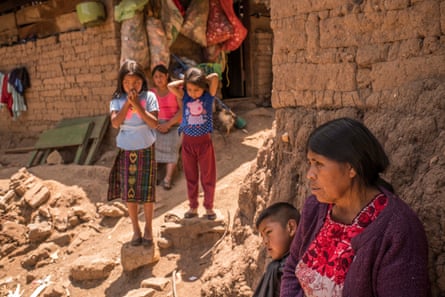Good morning.
Record after record has been broken this year. Antarctic sea ice hit “mind blowing” lows; greenhouse gas levels and global temperatures hit record highs, as did ocean temperatures, and there has been unprecedented mass coral bleaching. Another alarming record was hit on 17 November when the Earth briefly hit 2C of warming above pre-industrial levels for the first time.
This temporary fluctuation in temperature does not mean that we should throw in the towel, but it is a sign that the climate crisis is entering uncharted territory. All the scientific indications suggest that in the next decade, we will pass the critical 1.5C climate threshold unless drastic and immediate changes are made to move away from our reliance on fossil fuels.
To look back on the past year of the climate crisis, I spoke with environment correspondent Damien Gayle. That’s right after the headlines.
In depth: ‘Expect more wildfire, more floods, more intense droughts’

The UK’s progress on climate legislation has been described by the government’s independent advisers as “worryingly slow”. The government has not heeded the numerous warnings about its lethargic approach to the climate emergency – instead in September the government announced a “new approach” to Britain’s climate policy that slows things down even more, with Rishi Sunak claiming he would take a “pragmatic” approach to net zero that was not “ideological”, citing the cost of the policy. After numerous political defeats in the last year, it looks as though the government is taking aim at the green agenda in a bid to shore up support, despite the fact that the public are overwhelmingly concerned about the climate crisis.
Though he has insisted that he was “absolutely unequivocal” about the commitment to reach net zero carbon emissions by 2050, Sunak has delayed a ban on new petrol and diesel cars until 2035, granted new North Sea oil and gas licences and abandoned plans that would ensure landlords gained an energy performance certificate of grade C or higher for rental properties, making them more energy efficient. These choices have sparked significant criticism from climate scientists and campaign groups, who view these u-turns as regressive in the face of an accelerating climate emergency. Under this government’s policies, the UK will probably miss its Paris climate targets by a wide margin.
Climate protest
Top down government policies are not the only way to try to achieve change, as climate activists will tell you. This year many direct action groups have caused a huge splash in their efforts to raise awareness and pressure governments and large companies to take action before it is too late. The methods of nonviolent civil disobedience, that include anything from slow marching in the road to throwing food and paint at works of art, have been met with an increasingly repressive response from various governments around the world.
“The British government has been playing legislative ‘whack-a-mole’ with Insulate Britain, Extinction Rebellion and now Just Stop Oil. They tried to make blocking the roads by sitting on the ground a criminal offence, and when protesters started slow marching instead, they tried to curtail that too,” Damien says. In the first use of these new draconian, and often seemingly arbitrary, anti-protest powers, the police arrested more than 60 climate activists who were slow-marching outside parliament.
The British government is not alone in this approach to climate activism. A Guardian investigation found that countries “from Canada and the US to Guatemala and Chile, from India and Tanzania to the UK, Europe and Australia” are cracking down on climate protesters (such as a Guatemalan activist pictured below).
The increasingly aggressive response in the UK has meant that the legal system, which is already dealing with a huge backlog, is chock full of climate activists, some of whom are having to wait up to six months in jail before trial. Activists are also receiving harsher sentences now, which has incentivised more extreme behaviour: “making so many non-violent protest tactics illegal has meant that protesters are using more destructive tactics,” Damien says, because while more disruptive, “they will lead to similar sentences”.
after newsletter promotion
A positive and surprising new trend emerged this year as well: when climate protesters end up in front of a jury, “[it] is more likely to acquit the activists. It has happened so much that judges this year have started putting restrictions in place and saying that defendants cannot mention the climate crisis in their defence,” Damien says.
What next in 2024
Next year, we should expect more climate-related disasters, especially as El Niño intensifies, Damien says: “Expect more wildfire, more floods, more intense droughts”. Next year is also expected to be even warmer than 2023, which is “virtually certain” to be the hottest year on record. And in the run-up to a general election in the UK, we can also expect a “further stiffening” of the rhetoric and legislation designed to crack down on non-violent climate protest.
Though the government has slunk away from its commitment to addressing the climate crisis, and has targeted civil protest, a political shift does seem to be happening. Labour have said they will ban all new domestic oil and gas projects if they win power, and that they will insulate houses, which are the main goals of Just Stop Oil and Insulate Britain. The climate crisis is now leading the political agenda as the urgency of taking action becomes increasingly clear – though we have not yet seen any acceleration of the world’s energy transition away from fossil fuels, Damien adds.
If you are reading this on the app or website, over the Christmas period the headlines and sport will not appear. To get the full First Edition experience in your inbox every morning please sign up here.
1
2
3
4
5
1
2
3
4
5
1
2
3
4
5
1
2
3
4
5
1
2
3
4
5
1
2
3
4
5
1
2
3





